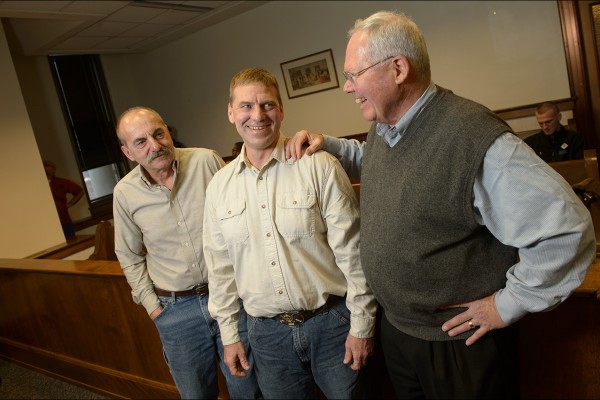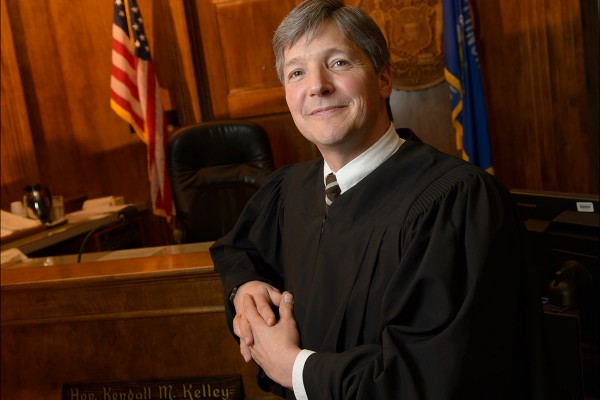Special treatment: Wisconsin courts offer alternatives for veteran defendants
By: WISCONSIN LAW JOURNAL STAFF//January 21, 2013//
Special treatment: Wisconsin courts offer alternatives for veteran defendants
By: WISCONSIN LAW JOURNAL STAFF//January 21, 2013//
By Jonathan Anderson, Special to Wisconsin Law Journal
and Caley Clinton, [email protected]

In August 2011, Christopher McNulty stood in his girlfriend’s Sturgeon Bay garage, a 22-caliber rifle in his hands and local police outside the door.
Drunk and suicidal, the 21-year veteran of the U.S. military fired at officers after a seven-hour standoff. Members of a SWAT team then took him into custody.
McNulty, now 41, was charged with first-degree attempted homicide, a felony that allows for a maximum sentence of 60 years in prison.
But he applied for and was accepted into a new veterans treatment court in Brown County, and the district attorney amended the charges to a lesser offense: first-degree recklessly endangering safety.
McNulty served 90 days in jail. He got out Jan. 8, but he’ll be spending time in the courts for much longer.
Participation in the Northeast Wisconsin Veterans Treatment Court is “not a free lunch,” after all, said Tom Hinz, mentor and resource coordinator for the specialty court. Established in March, the court requires participants commit to an 18-month program that includes, initially, weekly hearings in front of a judge, check-ins with a court-assigned mentor and total sobriety, which is monitored by drug and alcohol testing.
The court handles criminal cases of a lesser nature, Hinz said. Defendants accused of murder or other violent crimes do not participate, or are at least vetted on a case-by-case basis, he said.
McNulty initially was deemed ineligible, Hinz said, because of the severity of his crime. But then Hinz, a 37-year veteran of law enforcement, spoke to the Door County police officials who were at the scene that August night.
They looked at McNulty’s history and considered the fact that he had no criminal record.
“We had a long discussion about him, interviewed people to see if he was blowing smoke,” Hinz said. “After talking with everybody, we felt it was worth the risk. And so far, it’s proven to be.”
Through his participation in the program, McNulty was diagnosed with post-traumatic stress disorder and ordered to receive treatment. He also was required to get treatment for alcohol abuse.
The specialty court, McNulty said, has given him “a chance to recover, to get through some personal issues and realize I’m not alone.”
The program is strict, he said — he has to avoid poppy seeds and hand sanitizers containing alcohol, for example — but it’s turning his life around.
“I know,” McNulty said, “it’s going to help me with my issues and my problems.”

Courts growing in popularity
The northeast Wisconsin program is one of a growing number of veterans courts in the state. The first started in Rock County in 2009, and 10 others have opened since.
“A veterans court puts it all together,” Hinz said. “You can have counseling, job skills, encourage the veteran to get back into college so they can be a productive citizen again.”
The growing number of veterans courts in Wisconsin is consistent with a national trend, said Deborah Saunders, a senior information analyst at the National Center for State Courts in Virginia.
“It’s one of the most rapidly growing types of problem-solving courts right now,” she said. “There are over 100 veterans courts in 35 states, but at least 100 more are in the planning stages.”
The judiciary is beginning to recognize, she said, that veterans returning home face unique challenges, such as adjusting to civilian life, finding work and receiving adequate health care.
The U.S. Department of Veterans Affairs estimates that 20 percent of Iraq war veterans and 11 percent of veterans who served in the war in Afghanistan have PTSD. Addiction and substance abuse also are common among veterans, and veteran suicide and homelessness rates are on the rise.
“PTSD, trauma, other mental health problems, efforts toward self-medication — courts understood it, but they never really understood the significance of it,” said J.C. Moore, a defense lawyer with the Wisconsin State Public Defender’s Office in Milwaukee who served 29 years with U.S. forces. “The emergence of the veterans courts around the state, and a greater understanding of the issues, is helping courts appreciate the issues that veterans bring to the criminal justice system.”

How they work
Not all veterans are eligible. In addition to considering the nature of their crimes, the Northeast Wisconsin Veterans Treatment Court screens defendants through an application that asks them for detail of their service history. Combat experience is not a prerequisite.
Later, candidates face interviews with members of the deciding committee, which includes Hinz, a judge, the district attorney, a supervisor for the Department of Corrections and a veterans service officer, among others.
If they are accepted, each defendant is paired with a mentor. Mentors typically are veterans, too. They attend court with the defendant, offer guidance and stress accountability.
During the first of the program’s four phases, defendants are required to appear before the judge every week. When a case is called, a defendant and his or her mentor sit at a table in front of Brown County Circuit Judge Kendall Kelley.
The judge starts by asking each veteran the same question: “How are things going?”
He then asks questions unique to each veteran, such as the progress of treatment, improvement of health problems and status of employment. Kelley calls each case himself and often uses just the first names of the defendants.
What Kelley does most at veterans court hearings is listen, he said, and respond with encouragement, saying things such as, “You’re not alone,” “Don’t get discouraged” and “I understand.”
“Here, because you get to know everybody, you do want to affirm those things that people are doing well,” Kelley said. “Basically, the research has indicated that that is far more motivational than just coming in and saying
‘What did you do wrong this week?’ It’s a different model than we normally have.”
Everyone stays in the courtroom until all the defendants have talked with the judge. Kelley, a former judge advocate general, said the veterans have a sense of unity and commitment from their time in the service.
“Most of them take great personal pride in having taken an oath to support the Constitution,” the judge said. “This is not a place they ever expected to find themselves. They don’t want to be back here.”
But the time-intensive program is not for everyone, Hinz said.
“We’ve had a couple people that have said, ‘I’ll go spend my time in jail,’” he said. “They’d rather just spend 60 days in jail. This is a year-and-a-half program.”
Still, McNulty said, he is grateful for his time in the program. He now volunteers at a food pantry and was accepted to a PTSD treatment program through the Tomah VA Medical Center. He wants to enroll in college.
Perhaps most importantly, he said, he has a support network of people who care about him and understand him.
“Anyone can sit in jail for a year,” he said. “[Veterans court] keeps me focused on going to school, finding a job, navigating the VA system.”
Veterans courts on the rise
Treatment courts and programs specifically for the state’s veterans have cropped up across Wisconsin in the past few years.
Here is a look at when each started and what areas they cover.
2009
■ Rock County Veterans Treatment Court
(accepts cases from nearby counties such as
Dane, Jefferson, Walworth and Green)
■ Waupaca County Veterans Assistance Program
2010
■ Iron County Veterans Court
■ La Crosse County Veterans Court Initiative
2011
■ Chippewa Valley Veterans Treatment Court (covers Chippewa, Dunn and Eau Claire counties)
■ Pierce County Veterans Court (covers Pierce, St. Croix, Polk, Buffalo and Pepin counties
2012
■ Milwaukee County Veterans Treatment Initiative and Treatment Court
■ Northeast Wisconsin Veterans Treatment Court (covers Brown, Door, Kewaunee, Marinette,
Oconto, Outagamie and Waupaca counties)
■ Outagamie County Veterans Court
■ Second Judicial District Veterans Treatment Court (covers Kenosha, Racine and Walworth counties)
■ Sheboygan Area Veterans Court (covers Sheboygan, Winnebago, Manitowoc, Fond du Lac, Calumet and Ozaukee counties)
Legal News
- State Bar leaders remain deeply divided over special purpose trust
- Former Wisconsin college chancellor fired over porn career is fighting to keep his faculty post
- Pecker says he pledged to be Trump campaign’s ‘eyes and ears’ during 2016 race
- A conservative quest to limit diversity programs gains momentum in states
- Wisconsin prison inmate pleads not guilty to killing cellmate
- Waukesha man sentenced to 30 years for Sex Trafficking
- 12-year-old shot in Milwaukee Wednesday with ‘serious injuries’
- Milwaukee man convicted of laundering proceeds of business email compromise fraud schemes
- Giuliani, Meadows among 18 indicted in Arizona fake electors case
- Some State Bar diversity participants walk away from program
- Wisconsin court issues arrest warrant ‘in error’ for Minocqua Brewing owner
- Iranian nationals charged cyber campaign targeting U.S. Companies
WLJ People
- Power 30 Personal Injury Attorneys – Russell Nicolet
- Power 30 Personal Injury Attorneys – Benjamin Nicolet
- Power 30 Personal Injury Attorneys – Dustin T. Woehl
- Power 30 Personal Injury Attorneys – Katherine Metzger
- Power 30 Personal Injury Attorneys – Joseph Ryan
- Power 30 Personal Injury Attorneys – James M. Ryan
- Power 30 Personal Injury Attorneys – Dana Wachs
- Power 30 Personal Injury Attorneys – Mark L. Thomsen
- Power 30 Personal Injury Attorneys – Matthew Lein
- Power 30 Personal Injury Attorneys – Jeffrey A. Pitman
- Power 30 Personal Injury Attorneys – William Pemberton
- Power 30 Personal Injury Attorneys – Howard S. Sicula











